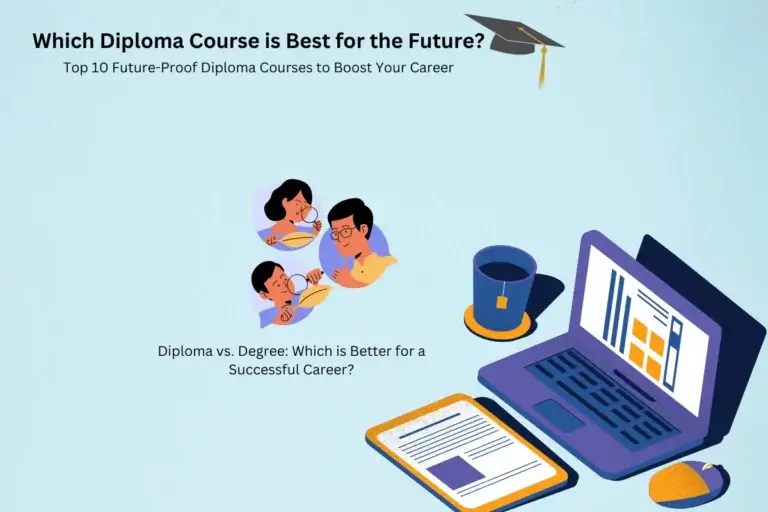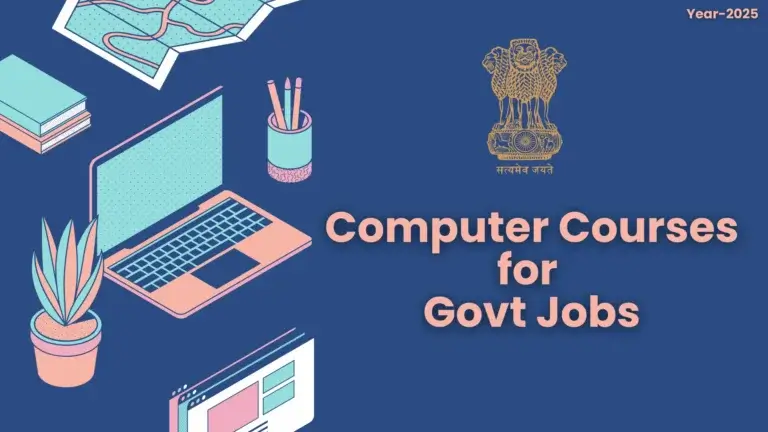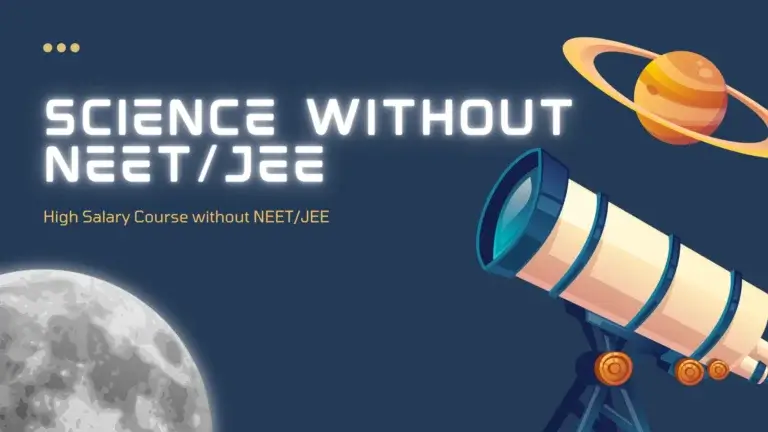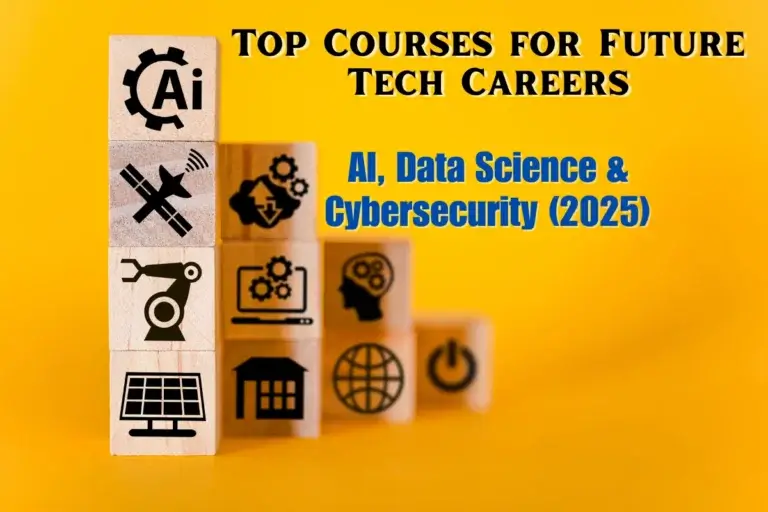Job-Oriented Diploma Courses: Your Fast Track to Career Success in 2025

Last Updated: August 4, 2025 at 11:22 pm
Are you tired of lengthy degree programs that don’t guarantee job placement? Job-oriented diploma courses might be your perfect solution. These practical, industry-focused programs are designed to get you job-ready in months, not years.
With the job market becoming increasingly competitive, smart professionals are choosing diploma courses that offer quick skill development and immediate career opportunities. This comprehensive guide will walk you through everything you need to know about job-oriented diploma courses, helping you make an informed decision for your career.
- What Are Job-Oriented Diploma Courses?
- Top 15 Job-Oriented Diploma Courses in 2025
- How to Choose the Right Job-Oriented Diploma Course
- Career Prospects After Job-Oriented Diploma Courses
- Online vs. Offline Job-Oriented Diploma Courses
- Financial Planning for Job-Oriented Diploma Courses
- Industry Partnerships and Placement Support
- Success Stories and Career Transformations
- Frequently Asked Questions (FAQs)
- How to Enroll in a Job-Oriented Diploma Course
- Tips for Success in Job-Oriented Diploma Courses
- Future Trends in Job-Oriented Education
- Conclusion: Your Next Steps Toward Career Success
What Are Job-Oriented Diploma Courses?
Job-oriented diploma courses are specialised training programs designed to provide practical skills and knowledge directly applicable to specific industries. Unlike traditional academic degrees, these courses focus on hands-on learning and industry-relevant skills that employers actively seek.
Key Features of Job-Oriented Diploma Courses:
- Duration: Typically 6 months to 2 years
- Focus: Practical, industry-specific skills
- Delivery: Online, offline, or hybrid modes
- Cost: More affordable than traditional degrees
- Outcome: Direct pathway to employment
Why Choose a Job-Oriented Diploma Over Traditional Degrees?
The modern job market values skills over degrees. Here’s why job-oriented diploma courses are gaining popularity:
Time Efficiency
- Complete your training in 6-24 months
- Start earning while peers are still studying
- Quick return on investment
Industry Relevance
- Curriculum designed by industry experts
- Real-world projects and case studies
- Current tools and technologies
Cost-Effective Learning
- Significantly lower fees than degree programs
- No hidden costs or lengthy commitments
- Immediate earning potential after completion
Top 15 Job-Oriented Diploma Courses in 2025
Technology & IT Diploma Courses
| Course Name | Duration | Average Fee Range | Starting Salary |
|---|---|---|---|
| Digital Marketing | 6-12 months | ₹15,000-₹50,000 | ₹3-5 LPA |
| Data Science & Analytics | 8-18 months | ₹40,000-₹1,50,000 | ₹4-8 LPA |
| Cybersecurity | 6-12 months | ₹25,000-₹80,000 | ₹3.5-6 LPA |
| Web Development | 6-18 months | ₹20,000-₹60,000 | ₹3-5 LPA |
| Mobile App Development | 8-15 months | ₹30,000-₹70,000 | ₹3.5-6 LPA |
Creative & Design Diploma Courses
Graphic Design
- Master Adobe Creative Suite
- Logo design, branding, and visual communication
- Portfolio development and client management
- Career Prospects: Graphic Designer, Creative Director, Freelance Designer
UI/UX Design
- User experience research and design thinking
- Prototyping tools like Figma and Sketch
- Responsive design and mobile optimization
- Career Prospects: UI Designer, UX Researcher, Product Designer
Business & Management Diploma Courses
Digital Marketing Specialist
- SEO/SEM, social media marketing
- Content marketing and email campaigns
- Analytics and performance tracking
- Industry Demand: 40% growth expected by 2026
Project Management
- Agile and Scrum methodologies
- Risk management and team leadership
- Budget planning and resource allocation
- Certification Integration: PMP, PRINCE2 compatibility
Healthcare & Allied Sciences
Medical Coding
- ICD-10, CPT coding systems
- Healthcare data management
- Insurance claim processing
- Remote Work Opportunities: 80% of positions offer work-from-home options
Pharmacy Technician
- Medication dispensing and inventory management
- Patient counseling and healthcare support
- Regulatory compliance
- Job Security: Essential healthcare role with stable demand
How to Choose the Right Job-Oriented Diploma Course
Step 1: Self-Assessment and Career Goals
Before selecting a course, evaluate your:
- Current skill level and learning capacity
- Career interests and long-term goals
- Financial situation and time availability
- Local job market demands and opportunities
Step 2: Research Course Curriculum and Faculty
Look for courses that offer:
- Updated curriculum reflecting current industry trends
- Experienced faculty with industry background
- Hands-on projects and real-world applications
- Industry partnerships for internships and placements
Step 3: Verify Accreditation and Recognition
Ensure your chosen course has:
- Government recognition (UGC, AICTE approval)
- Industry certifications from reputed organizations
- Employer acceptance in your target industry
- Alumni success stories and placement records
Career Prospects After Job-Oriented Diploma Courses
Immediate Employment Opportunities
Entry-Level Positions Available:
- Digital Marketing Executive
- Junior Data Analyst
- Web Developer
- Graphic Designer
- Customer Support Specialist
- Technical Writer
Salary Progression and Growth Potential
| Experience Level | Average Salary Range | Growth Rate |
|---|---|---|
| Fresher (0-1 year) | ₹2.5-4 LPA | Base Level |
| Junior (1-3 years) | ₹4-7 LPA | 60-75% growth |
| Mid-Level (3-5 years) | ₹7-12 LPA | 75-100% growth |
| Senior (5+ years) | ₹12-20 LPA | 100%+ growth |
Industry Sectors Actively Hiring
High-Demand Industries:
- Information Technology – Consistent 15-20% annual growth
- E-commerce – Rapid expansion requiring digital skills
- Healthcare – Essential services with stable demand
- Financial Services – Digital transformation creating opportunities
- Education Technology – Growing market for online learning
Online vs. Offline Job-Oriented Diploma Courses
Online Learning Advantages
Flexibility Benefits:
- Study at your own pace
- Work while learning
- Access to global instructors
- Lower overall costs
Top Online Platforms:
- Coursera – University partnerships, verified certificates
- upGrad – Industry mentorship, placement assistance
- BYJU’S – Interactive learning, career support
- Simplilearn – Professional certifications, hands-on labs
Offline Learning Benefits
Traditional Classroom Advantages:
- Direct interaction with instructors
- Networking opportunities with peers
- Hands-on lab access
- Structured learning environment
Financial Planning for Job-Oriented Diploma Courses
Course Fee Structure Breakdown
Typical Cost Components:
- Registration Fee: ₹1,000-₹5,000
- Tuition Fee: ₹10,000-₹1,50,000 (varies by course)
- Material Cost: ₹2,000-₹10,000
- Examination Fee: ₹1,000-₹3,000
Financing Options Available
Payment Methods:
- EMI Options – 0% interest plans available
- Education Loans – Banks offer specialized loans
- Employer Sponsorship – Many companies fund employee training
- Government Schemes – Skill development programs with subsidies
Industry Partnerships and Placement Support
What to Look for in Placement Assistance
Strong Placement Programs Include:
- Company Tie-ups with 50+ hiring partners
- Interview Preparation and soft skills training
- Resume Building and LinkedIn optimization
- Salary Negotiation support and guidance
Regional Employment Market Analysis
Metropolitan Cities:
- Mumbai: Finance, IT, and media opportunities
- Bangalore: Technology and startup ecosystem
- Delhi NCR: Government, corporate, and e-commerce
- Pune: Manufacturing and IT services
Tier-2 Cities:
- Emerging opportunities in digital services
- Lower living costs with competitive salaries
- Government initiatives supporting skill development
Read Also:
- Creative Careers for Arts: Your Ultimate Guide to Thriving in 2025
- Top Government Jobs After 12th Arts: Your Complete Career Guide for 2025
- Government of India Free Online Courses with Certificates: Your Gateway to Career Success in 2025
- Which Diploma Course is Best for a Government Job? A Practical Guide
Success Stories and Career Transformations
Real Student Achievements
Priya Sharma – Digital Marketing Success
- Background: B.Com graduate, no marketing experience
- Course: 8-month Digital Marketing Diploma
- Outcome: Social Media Manager at ₹4.5 LPA
- Timeline: Job placement within 2 months of completion
Rahul Kumar – Data Analytics Journey
- Background: Mechanical engineer seeking career change
- Course: 12-month Data Science Diploma
- Outcome: Business Analyst at ₹6 LPA
- Growth: 40% salary increase within first year
Frequently Asked Questions (FAQs)
How to Enroll in a Job-Oriented Diploma Course
Step-by-Step Enrollment Process
1. Research and Shortlist Courses
- Compare curriculum, fees, and placement records
- Read reviews and speak with alumni
- Attend demo classes or webinars
2. Check Eligibility Requirements
- Educational qualifications needed
- Work experience preferences
- Technical prerequisites
3. Application Submission
- Complete online application form
- Submit required documents
- Pay application/registration fee
4. Selection Process
- Written test or online assessment
- Personal interview (if required)
- Counseling session
5. Enrollment Confirmation
- Fee payment and documentation
- Course schedule and material access
- Orientation program attendance
Essential Documents Required
Typical Documentation:
- Educational certificates (10th, 12th, graduation)
- Identity proof (Aadhar, PAN card)
- Recent photographs
- Experience certificates (if applicable)
- Medical certificate (for specific courses)
Tips for Success in Job-Oriented Diploma Courses
Maximizing Your Learning Experience
During the Course:
- Active Participation in projects and discussions
- Networking with instructors and fellow students
- Portfolio Building with real-world projects
- Industry Exposure through internships and workshops
Career Preparation:
- LinkedIn Optimization with new skills and projects
- Resume Enhancement highlighting practical experience
- Interview Practice with technical and soft skills
- Continuous Learning through additional certifications
Future Trends in Job-Oriented Education
Emerging Course Categories
New-Age Skills in Demand:
- Artificial Intelligence and Machine Learning
- Blockchain Technology and Cryptocurrency
- Internet of Things (IoT) development
- Augmented Reality/Virtual Reality design
- Renewable Energy technology
Industry 4.0 Impact
The fourth industrial revolution is creating demand for hybrid skills combining technology with traditional domains. Future job-oriented courses will likely focus on:
- Digital Transformation across industries
- Remote Work technologies and management
- Sustainability and green technology
- Healthcare Technology and telemedicine
- Fintech and digital payments
Conclusion: Your Next Steps Toward Career Success
Job-oriented diploma courses represent one of the smartest investments you can make in your career. With the right course selection, dedication, and strategic planning, you can transform your professional life in less than two years.
The key to success lies in choosing a course that aligns with your interests, market demand, and career goals. Don’t wait for the perfect moment – the best time to start is now.
Ready to Transform Your Career?
Take these immediate action steps:
- Assess your current skills and career interests
- Research courses that match your goals and budget
- Connect with course advisors for detailed guidance
- Attend demo sessions to experience the learning approach
- Make your decision and begin your journey
Remember, every expert was once a beginner. Your job-oriented diploma course could be the catalyst that propels you toward the career you’ve always wanted. The opportunities are endless – it’s time to seize them.
This comprehensive guide covers all aspects of job-oriented diploma courses. For personalised course recommendations and career guidance, consult with education counsellors who can help you make the best choice for your unique situation.






